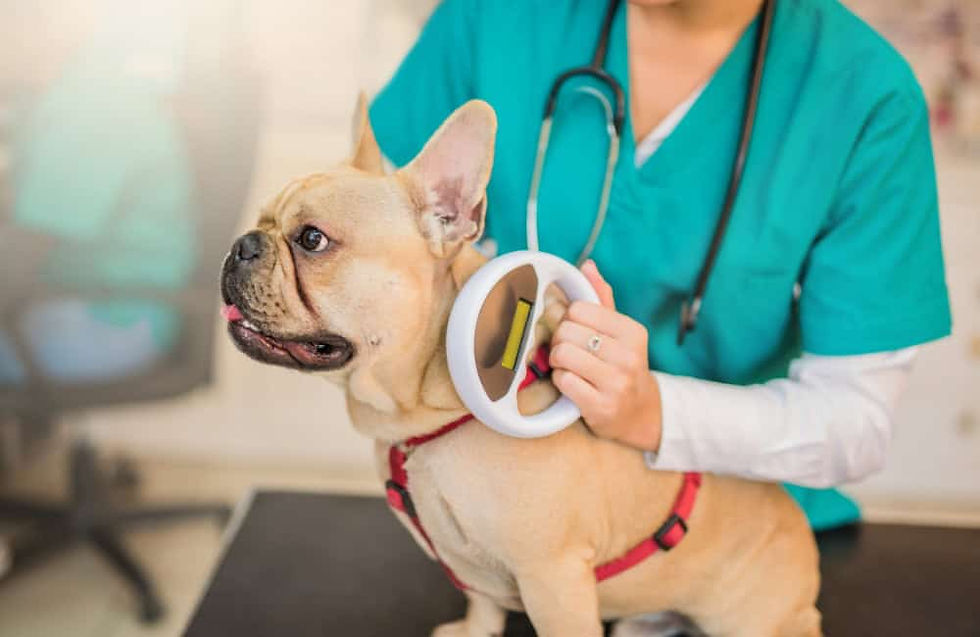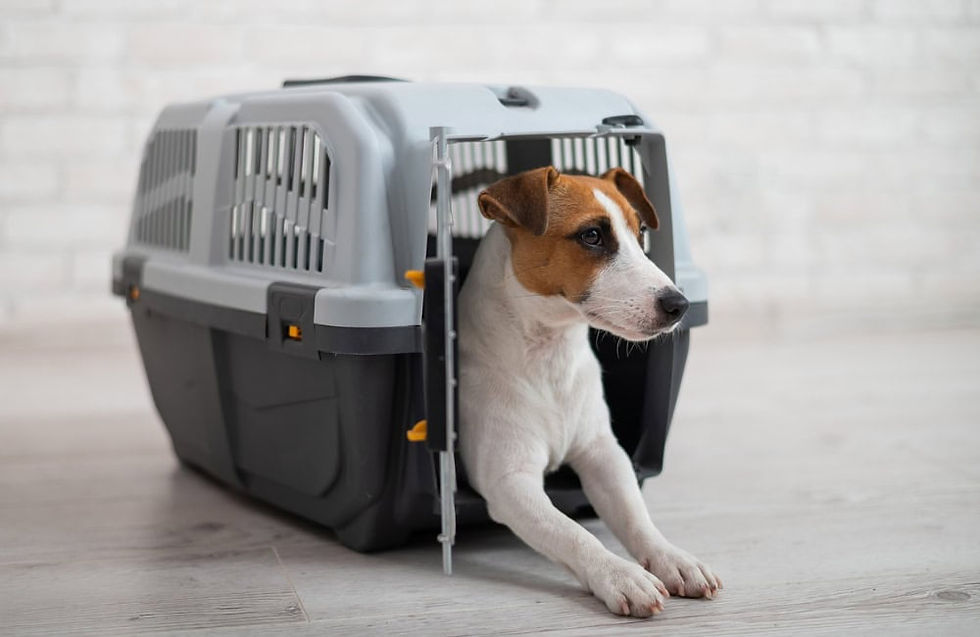How to Move Your Pet to Cyprus – Rules, Costs and Our Top Tips
- Sean

- Jul 28
- 5 min read

What You Need to Know About Moving Pets to Cyprus
When you are moving to a brand new country, you are going to want to make sure that you take absolutely everything that is important to you. For some of us, that may be our belongings, which are relatively simple to move and plan for. But for others, the moving process is going to prove to be a bit more complicated. This is because they are also looking to move their pets.
Every country has its own rules and regulations when it comes to bringing pets across borders, with Cyprus being no exception. If you’re planning a move to Cyprus with your pet, our guide is here to help. We’ll walk you through the key rules, expected costs, and top tips to make the relocation process as smooth and stress-free as possible for both you and your pet.
Does My Pet Need a Microchip?

Every single cat or dog that enters Cyprus will need to have a microchip. Not only this, but the microchip has to meet specific ISO standards (these are 11784 and 11785). If your microchip does not meet these standards, you must find a way to ensure it can be read; this is your responsibility.
As microchipping has become standard here in the UK, this may not be something that you need to worry about particularly, however, it is something that it is important to keep in mind.
Required Vaccinations for Pets Entering Cyprus?
In order to enter Cyprus, your pet must be vaccinated against rabies. Any pet without proof of a valid rabies vaccination will be denied entry to the country. This is something you’ll need to provide documented evidence for, typically in the form of an official vaccination certificate.
For most dogs and cats, the rabies vaccination is part of their initial vaccination schedule and is usually administered at the same time as their microchip is implanted. Your pet must be at least 12 weeks old before they can receive the vaccine.
Please note that the vaccine may take up to 21 days to become fully effective, so you’ll need to factor this into your travel timeline. Additionally, you must ensure that your pet is up to date with their rabies booster shots, as lapsed vaccinations may invalidate its entry clearance.
Does My Pet Need a Health Certificate To Enter Cyprus?

Yes, your pet will need an official veterinary health certificate to enter Cyprus. This certificate must confirm that your pet is healthy, fit for travel, and meets all entry requirements (such as rabies vaccination, microchipping, and tapeworm treatment if applicable).
The certificate must be completed by an authorised vet within 10 days before travel and must travel with your pet. In most cases, if you are travelling from the UK or another non-EU country, you will need to use the EU Animal Health Certificate (AHC), which replaces the old pet passport system for third-country entry into the EU.
Because the certificate is time-sensitive, it’s important to book your vet appointment close to your departure date to avoid any issues at border control.
What Are the Banned Dog Breeds in Cyprus?
Just like in other countries around the world, there are some breeds that are not allowed to enter Cyprus. These are: the Pit Bull Terrier, The Japanese Tosa, the Dogo Argentino and the Fila Braziliero. As well as any cross-breeds of these prohibited breeds are banned.
What If I’m Bringing a Pet That Isn’t a Cat or Dog?

If you’re planning to move with rabbits, birds, reptiles, or other exotic animals, different import rules may apply. In many cases, you’ll need special permits, and there may be additional health or quarantine requirements depending on the species.
It’s important to contact Cyprus’s Department of Veterinary Services well in advance to check the most up-to-date guidance for exotic pets. You should also speak with your vet about any travel precautions for less common animals.
Best Ways to Transport Your Dog or Cat to Cyprus?

You may wonder how you will be able to get your pet into Cyprus. The most common way is for them to travel as excess baggage or as manifested cargo. You will need to consider what is the best option for your pet and also remember that no matter which option you choose, there is going to be an element of stress for them, which you will need to try and manage as best as you can.
You may want to consult with your UK veterinarian before travelling to determine if there are ways to mitigate the stress levels your pet feels and to make the journey as comfortable as possible.
Once your pet arrives in the country, it will need to be inspected by a customs officer or a veterinary officer to ensure that it and its documentation are in order.
Will My Pet Need To Be Quarantined?
The good news is that if your pet meets all the import requirements for entering Cyprus, quarantine will not be necessary. However, if these conditions aren't met, your pet may be required to undergo quarantine upon arrival.
There are circumstances where you can ask for a special permit; however, you will need to ensure that this is arranged by the relevant authorities as soon as you know that it is likely to be needed.
How Much Does It Cost to Move a Pet to Cyprus from the UK?
The important thing to remember is that every pet relocation is different. The overall cost will depend on a variety of factors, including your pet’s size and breed, where you're travelling from, the airline you choose, and the paperwork and treatments required. It’s essential to carefully plan and budget not only for the transportation itself, but also for the necessary veterinary fees, documentation, and government approvals involved in meeting Cyprus’s import requirements.
Air Travel Costs
The most significant expense is often the transportation itself. Most pets travel to Cyprus by air, and the cost can vary dramatically depending on the airline and the services included. Major carriers such as British Airways typically charge around £2,600 for transporting pets like cats and dogs from the UK. This usually includes handling, crate transport, and care during the journey, but it’s always important to confirm what’s included in your quote.
There are also more affordable options available through other airlines or specialist pet relocation companies, with some quoting between £1,000 and £1,800, depending on the specifics of the journey and your pet’s needs. In many cases, choosing a slightly less well-known carrier can save you money, provided they meet international pet travel standards.
Additional Costs to Consider
Aside from the flight itself, you’ll need to account for:
Veterinary fees for vaccinations (such as rabies), microchipping, and the health certificate
Pet travel crate (must meet IATA standards)
Import permits and customs clearance fees (if applicable)
Airport handling fees at both departure and arrival
Pet travel agency fees (if using a relocation service)
Depending on your approach, the total cost of moving a pet to Cyprus can range from £1,200 to over £3,000. That’s why it’s crucial to get quotes early, compare services, and understand what’s included.
Let Us Help With Your Move to Cyprus

While we can’t assist directly with transporting your pet, at Pinnacle Removals, we can take the stress out of the rest of your relocation to Cyprus. Whether you're moving alone, with family, or alongside a four-legged friend, our expert team is here to make the process as simple and seamless as possible.
From professional packing and secure shipping to guidance on customs and delivery logistics, we’ll support you every step of the way. That means you can focus on settling into your new home in Cyprus, knowing that everything else is being taken care of.
Get in touch with our friendly team today and let us help make your move to Cyprus smooth, efficient, and worry-free.




Comments